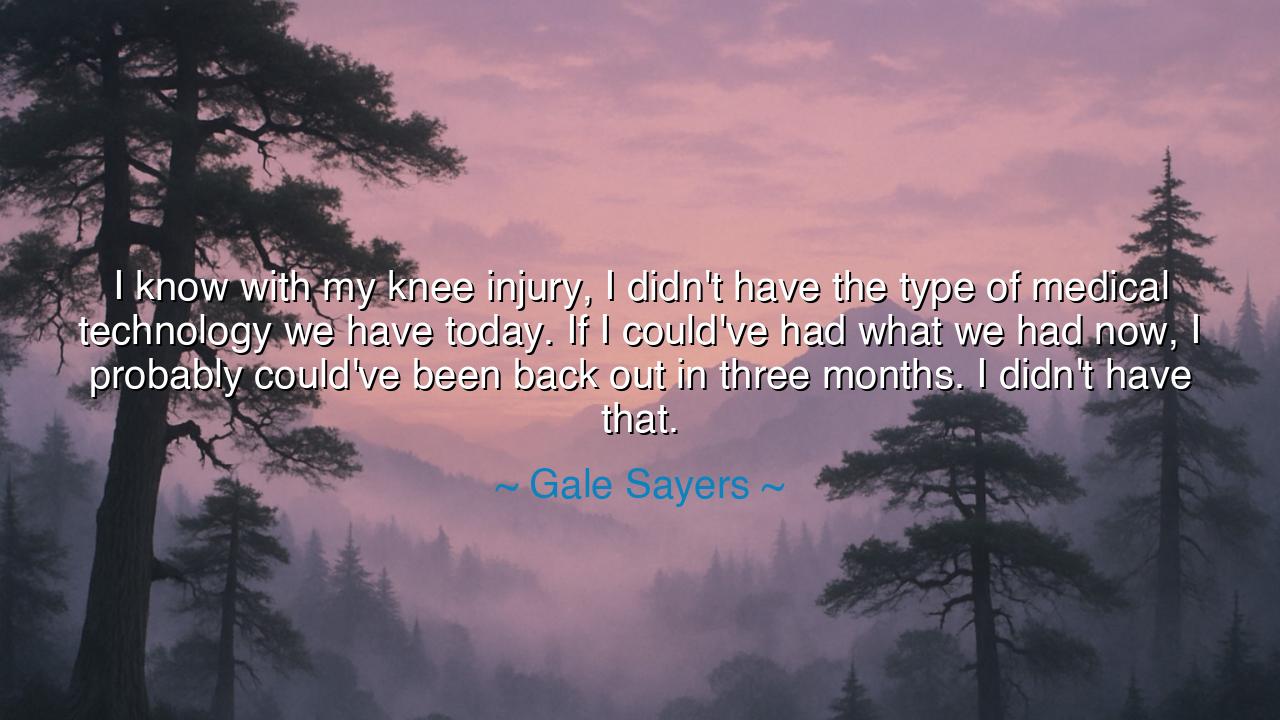
I know with my knee injury, I didn't have the type of medical
I know with my knee injury, I didn't have the type of medical technology we have today. If I could've had what we had now, I probably could've been back out in three months. I didn't have that.






Hear now, O seeker of endurance and remembrance, the words of Gale Sayers, the great running back of the gridiron, who said: “I know with my knee injury, I didn’t have the type of medical technology we have today. If I could’ve had what we had now, I probably could’ve been back out in three months. I didn’t have that.” Within this humble reflection lies the wisdom of a man who has tasted glory, loss, and the slow march of time. He speaks not in bitterness, but in understanding—an acknowledgment of how progress and fate intertwine, and how each generation stands upon the shoulders of the last.
Sayers was a comet that burned brightly in the skies of football. In the 1960s, he danced across the field with a grace that defied mortal balance. He was nicknamed “The Kansas Comet,” and his feet seemed guided by something divine. Yet, as in the tragedies of the ancients, his brilliance was struck down too soon. A devastating knee injury robbed him of what might have been the greatest career in the sport. In those days, medical science had not yet learned the art of restoring what nature had broken. Torn ligaments were not healed—they were sentenced. Thus, his lament carries both sorrow and gratitude: sorrow for what was lost, and gratitude for what others now gain through the advancement of medical knowledge and technology.
His reflection is not merely about sport, but about the passing of eras—a truth that touches every human pursuit. The tools of one age become the foundation of the next. What was impossible once becomes routine later. Yet, those who lived in the earlier time paid the price of discovery; they endured the darkness so that others might walk in light. Sayers’ injury, his pain, and his patience all became part of the great chain of progress that has led to the miracles of modern healing. In this way, his suffering was not in vain—it was sacrifice transmuted into legacy.
Consider, O listener, the story of Galileo Galilei, who gazed into the heavens with a crude telescope. What he saw—the moons of Jupiter, the movement of planets—cost him his freedom. He was condemned for seeing truth too early. Yet, centuries later, his instruments evolved into the mighty eyes of space telescopes that now behold the birth of galaxies. So too with Sayers: he was among those who bore the burden of limited science, so that future athletes could heal where once they would have fallen. Progress often walks upon the bones of pioneers, and each era owes its ease to the pain of those before.
There is also a deeper lesson in humility within his words. Sayers does not rage against the past, nor curse his fate. He speaks with acceptance—a wisdom born from experience. The ancient Stoics taught that man does not control what happens to him, only how he meets it. The wise man grieves not for what he lacks, but honors what he has learned. By acknowledging the limits of his time without resentment, Sayers reveals his greatness not only as an athlete, but as a philosopher of endurance.
His reflection carries yet another meaning: the importance of gratitude for advancement. Many today walk strong, run fast, and recover swiftly because others have fallen before them. The world forgets how costly its progress has been. To remember this truth is to live with reverence—for medicine, for history, for those whose misfortune paved the way. Every new discovery is not a triumph of genius alone, but also of pain endured and lessons learned through struggle.
The lesson is clear: the arc of time bends toward improvement, but it demands patience, humility, and sacrifice. Whether in medicine, art, or the spirit, each generation must honor the limitations of its past while building a better future. Do not envy those who come after you, nor pity those who came before; instead, see yourself as part of the same unbroken chain of human striving.
O seeker of wisdom, remember this: Gale Sayers’ words remind us that greatness is not measured by longevity, but by grace in the face of loss. To lament without bitterness, to honor progress without envy—this is the path of maturity. The tools of tomorrow may heal what we cannot today, but the spirit of perseverance remains timeless. Let us, therefore, walk forward with gratitude, knowing that every trial endured becomes the foundation of another’s triumph.






AAdministratorAdministrator
Welcome, honored guests. Please leave a comment, we will respond soon